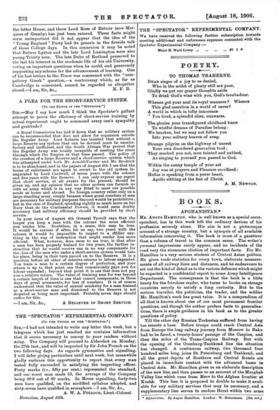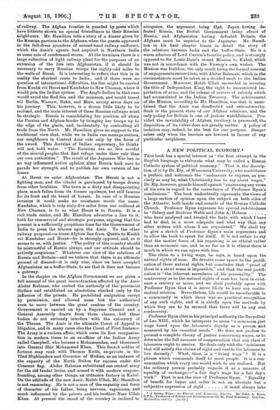BOOKS.
AFGHANISTAN.* MR. ANGUS HAMILTON, who is well known as a special corre- spondent, has in this work left the ordinary devices of his profession severely alone. His aim is not a picturesque account of a strange country, but a synopsis of all available information concerning it. The book is more of a gazetteer than a volume of travel in the common sense. The writer's personal impressions rarely appear, and no incidents of the road vary the strenuous citation of important facts. For Mr. Hamilton is a very serious student of Central Asian politics. He gives trade statistics for every town, elaborate measure- ments of all railway lines and distances, and be endeavours to set out the kind of detail as to the various defences which might be expected in a confidential report to some Army Intelligence Department. The consequence is that the book is a little heavy for the frivolous reader, who turns to books on strange countries merely to satisfy a limp curiosity. But to the serious traveller, the politician, the trader, and the soldier Mr•. Hamilton's work has great value. It is a compendium of all that is known about one of our most permanent frontier questions, and though the author prefers facts to generalisa- tions, there is ample guidance in his book as to the greater questions of policy.
Till the other• day Russian Turkestan suffered from having too remote a base. Before troops could reach Central Asia from Europe the long railway journey from Moscow to Baku had to be faced, a twenty-hours' passage of the Caspian, and then the miles of the Trans-Caspian Railway. But with the opening of the Orenburg-Tashkend line the situation has changed. A continuous railway, two thousand four hundred miles long, joins St. Petersburg and Tashkend, and all the great depots of Southern and Central Russia are placed in immediate contact with the advanced bases in Central Asia. Mr. Hamilton gives us an elaborate description of the new line, and then passes to an account of the Mnrghab Valley line which runs from Mery to the Afghan frontier at Kushk. This line it is proposed to double to make it avail- able for any military services that may be necessary, and a supplementary line serves to enclose Herat within two arms
• Afghanistan. By Angus Hamilton. London: W. Heinemann. [25s. net. J of railway. The Afghan frontier, is guarded by poste which have hitherto shown no special friendliness to their Russian neighbours. Mr. Hamilton tells a story of a dinner given by the Russian garrison to the Afghans, when the guests appeared in the full-dress grandeur of second-hand railway uniforms, which the Amir's agents had acquired in Northern India at some sale of condemned stores. At the terminus there is a large collection of light railway plant for the purposes of an extension of the line into Afghanistan, if it should be necessary to carry Russian troops the eighty-odd miles to the walls of Herat. It is interesting to reflect that this is in reality the shortest route to India ; and if there were no question of international difficulties, the line might be carried from Kushk via Herat and Kandahar to New Chaman, where it would join the Indian system. The Anglo-Indian in that case would avoid the Red Sea and the monsoon, and would travel raid Berlin, Warsaw, Baku, and Merv, saving seven days on his journey. This, however, is a dream little likely to be realised, and the main interest of these Russian railways must be strategic. Russia is consolidating her position all along the Persian and Afghan border by bringing her troops up to the edge of the glacis, and, incidentally, by controlling all trade from the North. Mr. Hamilton gives no support to the traditional view that, while we in India can manage natives, our neighbours in Central Asia• rule only by the force of the sword. This doctrine of Indian supremacy, be thinks will not hold water. "The Ruisians are no less careful of the several peoples that find refuge under their rule than our own authorities." The result of the Japanese War has in no way influenced native opinion, since Russia took care to parade her strength and to publish her own version of her losses.
At Herat we enter Afghanistan. The literati is not a fighting man, and the citadel is garrisoned by troops drawn from other localities. The town is a dirty and disappointing place, much fallen from its former opulence, but still famous for its fruit and its breed of horses. In case of a Russian invasion it could make no resistance worth the name. Kandahar, which is only sixty-five miles from our railhead at New Chaman, is to us what Herat is to Russia. It is a rich trade centre, and Mr. Hamilton advocates a line to it, both for commercial and strategic purposes, arguing that the present is a sufficiently propitious time for the Government of India to press the scheme upon the Amir. To the other railway proposal—a trans-Afghan line from Quetta to Kushk via, Kandahar and Herat—he is strongly opposed, and, as it seems to us, with justice. " The policy of this country should be mistrustful of Russia always, and our attitude should be actively suspicious." Whatever our view of the relations of Russia and Britain—and we believe that there is no ultimate ground of discord—it is only wise, since we have accepted Afghanistan as a buffer-State, to see that it does not become a gateway.
In the chapter on the Afghan Government we are given a full account of the great reconstruction effected by the Amir Abdur Rahman, who curbed the authority of the provincial Sirdars and established an absolutism checked only by the influence of the priests. He prohibited emigration except by permission, and allowed none but the authorised even to move between the great centres of the country. Government is carried on by a Supreme Council and a General Assembly drawn from three classes, but these bodies do not seriously interfere with the autocracy of the Throne. The Amir is the ultimate Court of Appeal in litigation, and in many cases also the Court of First Instance. The Army is a curious affair, which owes its first reorganisa- tion in modern times to an ex-officer of the Indian Army called Campbell, who became a Mohammedan, and blossomed into General Shir Mohammed Khan. This Scotch soldier of fortune may rank with Thomas Keith, ex-private in the .72nd. Highlanders and Governor of Medina, as an instance of the capacity of the North Briton for success under the Crescent flag. Abdur Rahman substituted one central army for the old feudal levies, and armed it with modern weapons, founding, among other things, an ordnance factory in Kabul. On the attitude of the new Amir, Habib Ullah, Mr. Hamilton is not reassuring. He is not a man of the sagacity and force of character of his father, being nervous, capricious,' and much influenced by the priests and his brother, Naar Ullah Khan. At present the mood of the country is inclined to
arrogance, the argument being that, Japan having de- feated Russia, the British Government' being afraid of Russia, and Afghanistan having defeated Britain, the Afghans must be superior to the Japanese. Mr. Hamil- ton in his final chapter traces in detail the story of the relations between India and the buffer-State. He is a warm admirer of Lord Curzon's frontier policy, and is strongly opposed to Sir Louis Dine's recent Mission to Kabul, which was not in accordance with the Viceroy's own wishes. The Mission was fruitless, the only result being the formal renewal of engagements entered into with Abdur Rahman, which in the circumstances must be taken as a decided snub to the Itidian Government. Moreover, Habib Ullah succeeded in securing the title of Independent King, the right to unrestricted im- portation of arms, and the release of arrears of subsidy which had accumulated in the Indian Treasury. The achievement of the Mission, according to Mr. Hamilton, was that it ascer- tained that the Amir was disaffected and untrustworthy. Such is the present state of our Afghan relations, and the only policy for Britain is one of jealous watchfulness. Pro- vided the inviolability of Afghan territory is preserved, the disposition of its rulers does not greatly matter. A policy of isolation may, indeed, be the best for our purpose. Danger arises only when the barriers are lowered in favour of any particular neighbour.



































 Previous page
Previous page